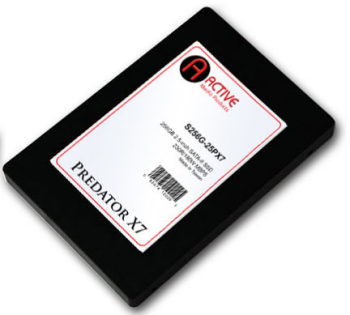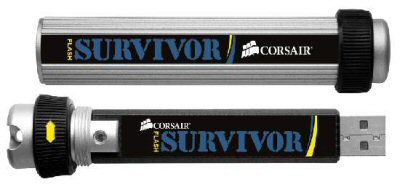- Details
- Flash Memory
SanDisk Corporation, the global leader in flash memory cards, today announced that the SanDisk® Cruzer® Enterprise FIPS edition secure USB flash drive has received Common Criteria EAL2 certification, making it the only USB flash drive to earn both Federal Information Processing Standards (FIPS) 140-2 Level 2 certification and Common Criteria certification.
The Common Criteria is an internationally recognized ISO standard (ISO/IEC 15408) used by governments and other organizations to assess the security functional requirements and security assurance requirements of technology products. With its certifications recognized in 26 countries, Common Criteria is an important global evaluation standard for security products.
"Common Criteria evaluations require a thorough examination of the entire device to certify its effectiveness in protecting the confidentiality, integrity and availability of sensitive information, including a comprehensive review of company internal processes," said David Matot, product marketing manager, enterprise solutions, SanDisk. "Cruzer Enterprise flash drives are the only USB drives in the world to hold both FIPS 140-2 and Common Criteria certifications, making them the USB flash drive of choice for organizations that require proven solutions from a leader in secure removable storage."
- Details
- Flash Memory
Active Media Products, manufacturer of SSDs and innovative USB drives, today announced imminent arrival of a line of Predator-X7 2.5-inch SATA-II 3Gbps Windows® 7 compatible SSDs built with the new Jmicron JM612 controller.

Predator X7 SSDs will be offered in capacities from 32GB to 256GB. At the heart of these SSDs is the JMF612 controller, which boasts numerous advances in features and performance. The 8-channel flash controller combined with 128MB of DRAM cache achieves sequential read speeds up to 230MB/sec and sequential write speeds up to 180MB/sec. "One big advantage of this controller is its support for a USB 2.0 port, which can be used for cloning the contents of your old hard drive onto the Predator X7. The mini USB port makes installation and setup a lot faster and easier." stated Active Media Products' VP of Sales, Jerry Thomson.
- Details
- Flash Memory
Corsair, a worldwide leader in high-performance computer memory, power supplies and flash memory products, including solid-state drives, today announced the new 64GB Flash Survivor USB drive, the most rugged high-capacity flash drive on the market.

Corsair's ultra-durable Flash Survivor USB drives have proven extremely popular with consumers thanks to their super-strong, CNC-milled, aircraft-grade aluminum casing, which makes them practically indestructible. Each drive is also fitted with a molded, shock-dampening collar and EPDM seal, which provides water-resistance to a depth of 200 meters. In independent reviews, the Flash Survivor has been dropped, baked, boiled, encased in ice, zapped in a microwave and even run over by an SUV, yet it still came back for more!
- Details
- Flash Memory
When designing solid-state storage for enterprise applications, standard SLC NAND has been the technology of choice because of its reliability and endurance. But customers are often challenged on how to cost-effectively reach their capacity requirements. Micron Technology, Inc. is meeting customers’ requirements by announcing today that it has leveraged its award-winning 34nm NAND process to manufacture an MLC Enterprise NAND device, which provides enterprise organizations a way to cost-effectively and reliably double their flash-based enterprise storage capacity (since MLC provides twice the capacity in the same die size as SLC). Micron’s new MLC Enterprise NAND device achieves 30,000 write cycles – a 6x increase in endurance when compared to standard MLC NAND. And for enterprise applications that are more performance driven, Micron today also introduced a 34nm SLC Enterprise NAND device that achieves 300,000 write cycles – a 3x increase in endurance when compared to standard SLC NAND.
- Details
- Flash Memory
SanDisk Corporation, the global leader in flash memory cards, today announced it has begun production shipments of flash memory cards based on the company's advanced X4 flash memory technology. This innovative new technology holds four bits of data in each memory cell, twice as many as the cells in conventional multi-level cell (MLC) NAND (2-bits-per-cell) memory chips.
Based on 43-nanometer (nm) process technology, the 64-gigabit (Gb) NAND flash chip is the highest-density single-die memory device in the world to enter production. SanDisk is shipping 8 gigabyte (GB) and 16GB SDHC cards as well as 8GB and 16GB Memory Stick PRO Duo™ cards using X4 technology.
"The development and commercialization of X4 technology represents an important milestone for the flash storage industry," said Sanjay Mehrotra, president and chief operating officer, SanDisk. "Our challenge with X4 technology was to not only deliver the lower costs inherent to 4-bits-per-cell, but to do so while meeting the reliability and performance requirements of industry standard cards that employ MLC NAND. Our world-class design and engineering team has applied its deep experience with high speed 2 and 3-bits-per-cell flash chip designs and collaborated closely with our leading design partners to develop and perfect new and powerful error correction algorithms to assure reliable operation. This intensive multi-year effort has generated powerful new patents and know-how, and demonstrates SanDisk's relentless drive for innovations that result in the ever expanding use of flash storage in consumer applications such as music, videos, photos, games and numerous third party applications."

